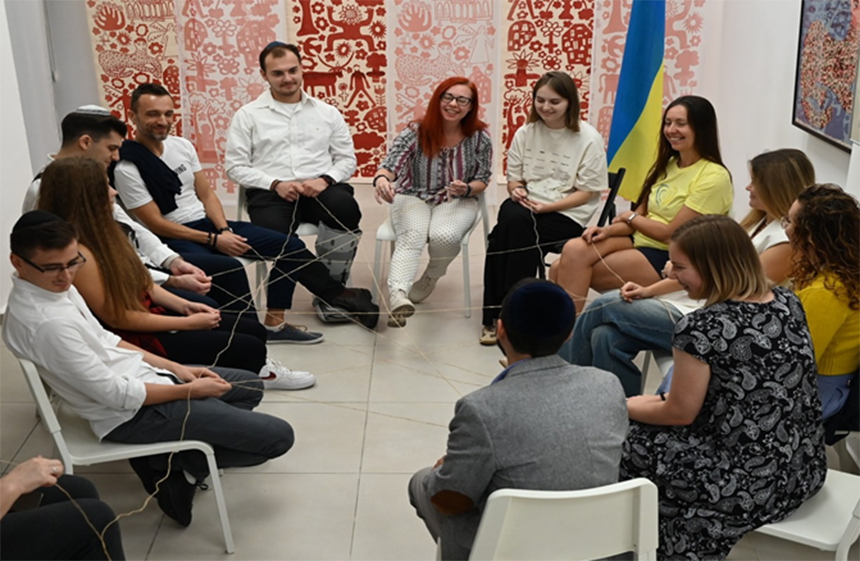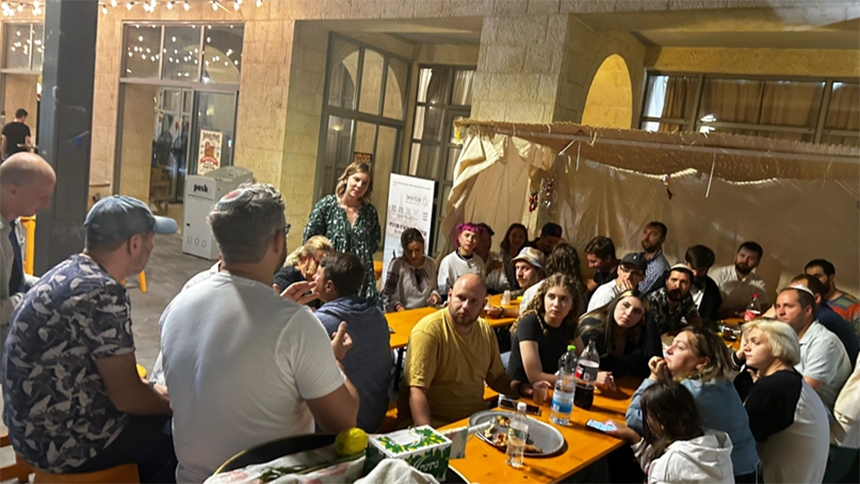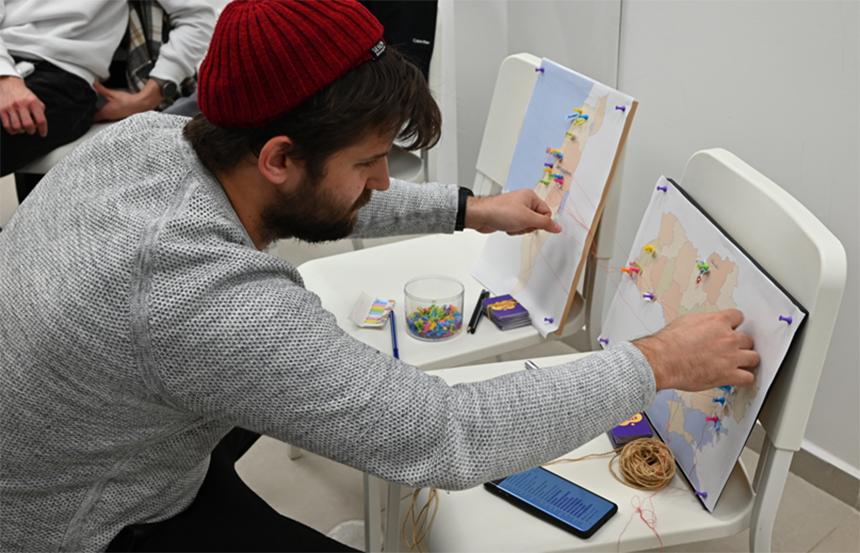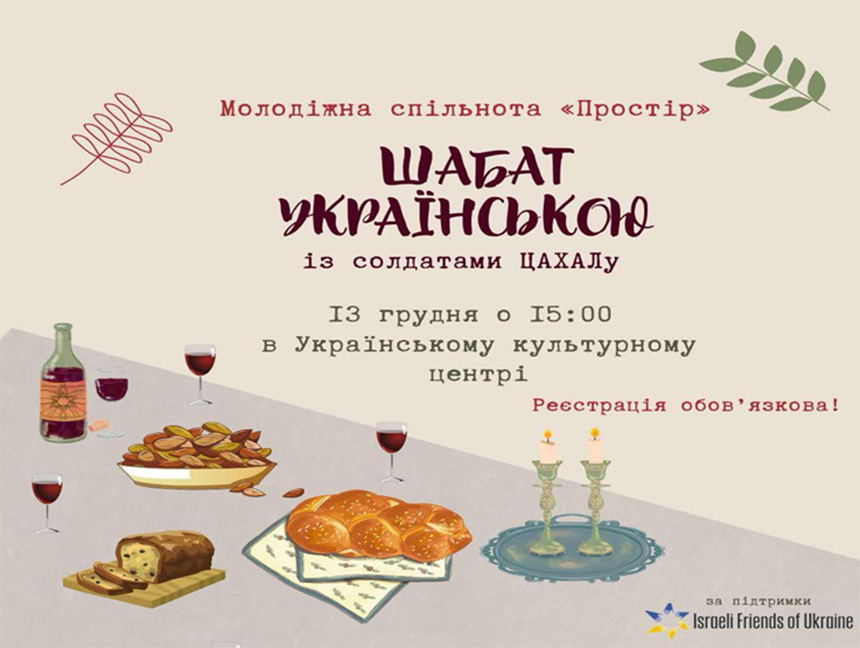Ukrainian-Jewish Prostir in Israel
A new trend in Israel is that young immigrants from Ukraine are searching for ways to integrate their Ukrainian, Jewish, and Israeli identities against the backdrop of wars in both countries. This demand is met by the Prostir youth initiative in Tel Aviv.
Prostir is the first Ukrainian-speaking Jewish youth community in Israel. It began operating in the fall of 2024 with the support of Israeli Friends of Ukraine and the Ukrainian Cultural Center in Tel Aviv. It adopted the motto: "Preserving our Ukrainian, learning our Jewish, and shaping our Israeli identities." The group's mission is to form a socially responsible youth community of Ukrainian-speaking Israelis. The target audience is Ukrainian-speaking youth aged 18-40 living in Gush Dan, the megalopolis of Tel Aviv and neighboring cities in central Israel.
Nearly 500,000 Ukrainians live in Israel now, including more than 15,000 who have made emergency repatriation after 2022. In addition, there are about 14,000 Ukrainian refugees temporarily staying in the country without the right to repatriation. Curiously, 540 new repatriates are lone soldiers from Ukraine serving in the Israel Defense Forces (IDF).
Organizations with Israeli content usually use Hebrew, English, and Russian. However, many repatriates from Ukraine have not mastered Hebrew or English sufficiently well, while Russian is a negative trigger for them. Therefore, there is a need for their"own" space because a safe environment is key to high-quality integration while preserving identity.
Olga Brodska, who heads the Prostir project, was born and studied in Dnipro. She has lived in Israel since 2016 and served in the IDF. She is proud to have attracted more than 25 young Israelis from Ukraine to her project in the first months. According to Brodska's plan, Prostir has the following goals:
- psychosocial support for new repatriates from Ukraine;
- smooth integration into Israeli society;
- developing a socially responsible position among participants;
- creating an active and cohesive youth community of Ukrainian-speaking repatriates;
- preserving and popularizing Ukrainian-Jewish heritage;
- strengthening cultural dialogue between Ukraine and Israel.
Since she was a child, Brodska participated in educational projects administered by the Solomonica Jewish Cultural Center in Dnipro with the support of the American Joint Committee. She graduated from the College of Hotel Business in 2013 and planned to work in a hotel in the Crimea. Brodska graduated from the Metsada leadership course and wrote a brochure for youth leaders. She went to Israel at the age of 19 as part of the Taglit youth program and later within the MASA student program. She repatriated in 2017; parts of her family live in Dnipro, Haifa, and Italy.
Since 2016, Brodska has participated in seminars on the Holocaust and Holodomor, organized by the Israeli Friends of Ukraine with the support of UJE. "These seminars, which touched upon the common historical topics of our two peoples, were very engaging and relevant," she says.
Brodska is currently studying Sociology, Anthropology and Communications at Tel Aviv University. She is involved in the Prostir project as part of the Rothschild Ambassadors Leadership Fellowship Program.
"The young men and women who come to Prostir are former youth leaders or Jewish program participants in Ukraine. They miss communication and the familiar atmosphere. Almost all of them were born in independent Ukraine and received their education at schools and universities in Ukrainian. This is an entirely new generation that identifies as the Ukrainian Jews of Israel," Brodska explains.
"That's why it's crazy for such people to hear someone make a generalization and call them part of the 'Russian street' of Israel. It irritates and repels them. For the most recent immigrants, it also hinders their integration into Israeli society. All programs with Jewish content are offered to them in Russian, causing a negative trigger reaction among immigrants from Ukraine, especially those who arrived during Russia's aggression against Ukraine," Brodska notes.
To the question about possible conflicts between new immigrants from Ukraine and Russia against the backdrop of the war, she says: "Immigrants from Ukraine are not always comfortable being in the same class or on Shabbat with new immigrants from Russia. In some cases, Russian Federation immigrants comprise most of the classroom population. I have been told, for example, that when there are two Ukrainians and 15 Russians in a Hebrew language course, the teacher translates the words from Hebrew into Russian, and this causes a protest from our people. It's as if they are overlooked, as if there is no war, and they are considered 'Russian.' This repels them, forcing them into reclusive behavior."
According to Brodska, Ukrainian identity becomes a protective mechanism for repatriates from Ukraine and a safe channel for their integration into Israeli society: "People with a Ukrainian Jewish identity come to us. Among my acquaintances, 90% consider themselves the Ukrainian Jews of Israel. This young generation has absorbed Jewish communal values and the ideas of the Maidans. This is what makes Prostir unique: it enables participants to support three identities — Ukrainian, Jewish, and Israeli — without dictating which of the three should be the main one and leaving it up to them to decide."
In Prostir, people communicate in Ukrainian or in any other language they feel comfortable with. They pay for their food and choose to come to the Ukrainian-language Shabbat. The participants hail from all over Ukraine — Lviv, Transcarpathian, Kyiv, and Cherkasy regions, as well as Kharkiv, Donetsk, Sumy, Dnipro, and Zaporizhia. To participate in meetings, people travel from Tel Aviv, Haifa, and Jerusalem.
The Prostir youth group held one of its meetings at an extreme tourism park to learn how to overcome fear, and helped repair bomb shelters on another occasion. One of the most important Shabbatot the group spent together was with IDF soldiers and officers who are natives of Ukraine, including single soldiers whose parents do not live in Israel. "One of the soldiers said we became his only support group," Brodska notes.
The initial success of the Prostir pro-Ukrainian initiative immediately caused pro-Russian provocateurs to attack. Prostir scheduled a Shabbat celebration with soldiers at the Ukrainian Cultural Center in Tel Aviv in mid-December 2024. The night before, unknown individuals pasted the center's windows and doors with Ukrainian-language posters containing messages aimed against Israel and IDF soldiers. On 5 February 2025, the Israeli police arrested two people, one of whom was from Russia. The same posters were found in their homes, as well as smoke bombs, air guns, ammunition, and anti-Israel materials of an ultra-left orientation.
Prostir plans to hold more joint events with Ukrainian refugees and a Ukrainian-language Pesach celebration. "The majority of people who come to us are young single adults. They often end up alone during holidays, and we don't want them to feel lonely," Brodska says.
Prostir is preparing a special meeting with a psychologist and a ceremony of lighting memory candles for 24 February 2025, on the third anniversary of the start of the full-scale war in Ukraine. After that, Prostir activists will join a mass march through Tel Aviv's center to support Ukraine, an event organized by the Israeli Friends of Ukraine.
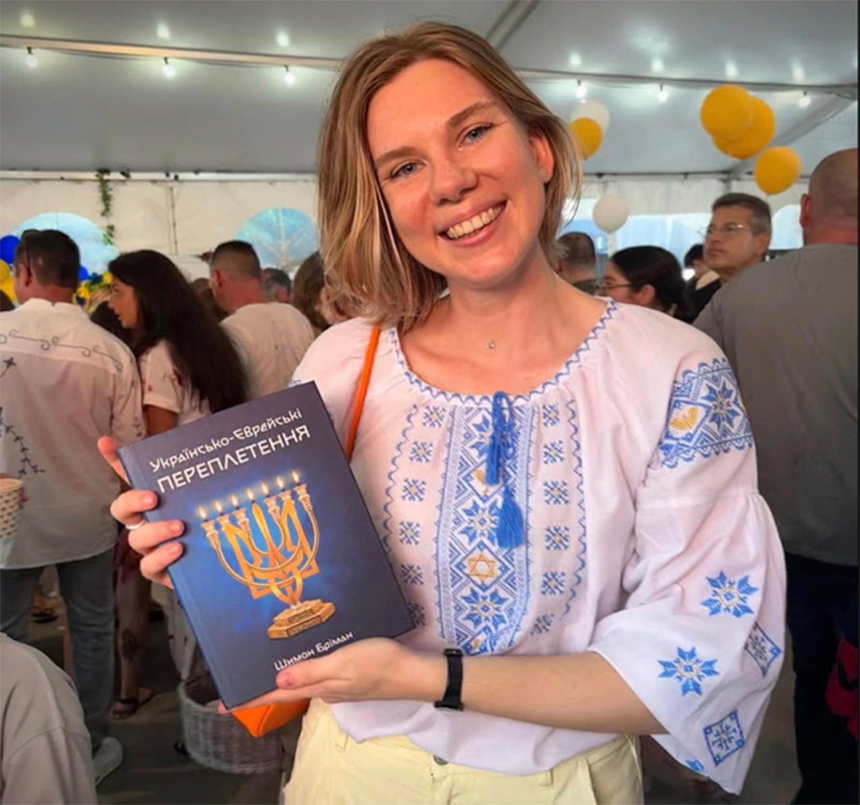
Text: Shimon Briman (Israel).
Photos: Olga Brodska.
Translated from the Ukrainian by Vasyl Starko.







